In Dust and Ashes Read online
‘Step aside, Stieg Larsson, Holt is the queen of Scandinavian crime thrillers’ Red
‘Holt writes with the command we have come to expect from the top Scandinavian writers’ The Times
‘If you haven’t heard of Anne Holt, you soon will’ Daily Mail
‘It’s easy to see why Anne Holt, the former Minister of Justice in Norway and currently its bestselling female crime writer, is rapturously received in the rest of Europe’ Guardian
‘Holt deftly marshals her perplexing narrative … clichés are resolutely seen off by the sheer energy and vitality of her writing’ Independent
‘Her peculiar blend of off-beat police procedural and social commentary makes her stories particularly Norwegian, yet also entertaining and enlightening … reads a bit like a mash-up of Stieg Larsson, Jeffery Deaver and Agatha Christie’ Daily Mirror
ANNE HOLT is Norway’s bestselling female crime writer. She spent two years working for the Oslo Police Department before founding her own law firm and serving as Norway’s Minister for Justice between 1996 and 1997. She is published in thirty languages with over seven million copies of her books sold.
Also by Anne Holt
THE HANNE WILHELMSEN SERIES:
Blind Goddess
Blessed Are Those Who Thirst
Death of the Demon
The Lion’s Mouth
Dead Joker
No Echo
Beyond the Truth
1222
Offline
THE VIK/STUBO SERIES:
Punishment
The Final Murder
Death in Oslo
Fear Not
What Dark Clouds Hide
First published in Great Britain in 2017 by Corvus, an imprint of Atlantic Books Ltd.
Copyright © Anne Holt, 2016
English translation copyright © Anne Bruce, 2017
Originally published in Norwegian as I støv og aske. Published by agreement with the Salomonsson Agency.
The moral right of Anne Holt to be identified as the author of this work has been asserted by her in accordance with the Copyright,
Designs and Patents Act of 1988.
All rights reserved. No part of this publication may be reproduced, stored in a retrieval system, or transmitted in any form or by any means, electronic, mechanical, photocopying, recording, or otherwise, without the prior permission of both the copyright owner and the above publisher of this book.
This novel is entirely a work of fiction. The names, characters and incidents portrayed in it are the work of the author’s imagination. Any resemblance to actual persons, living or dead, events or localities, is entirely coincidental.
This translation has been published with the financial support of NORLA.
10 9 8 7 6 5 4 3 2 1
A CIP catalogue record for this book is available from the British Library.
Paperback ISBN: 978 1 78239 882 0
OME ISBN: 978 1 78239 883 7
E-book ISBN: 978 1 78239 884 4
Printed in Great Britain.
Corvus
An imprint of Atlantic Books Ltd
Ormond House
26–27 Boswell Street
London
WC1N 3JZ
www.corvus-books.co.uk
‘Therefore I despise myself, and repent in dust and ashes.’
Book of Job, 42.6
FRIDAY JANUARY 1, 2016
Only a fortnight left, and then it would all be over.
And everything could begin.
Their new life, he and his wife in Provence. She was the one who had insisted on a move. He couldn’t speak French, and didn’t drink wine, but at least the climate down there was appealing. He had been in the police since 1978 when he had entered what they had then called Police College, and it was high time he found something else. Dog breeding, that was what he and his old woman had decided upon.
A whole lifetime had gone by since the end of the seventies; a couple of generations of Norwegians and thirty-nine sets of trainee officers. Or police students, as they had snootily come to be called over the years. He himself had started in the police force when they used pen and paper and the odd IBM golf ball typewriter, and the youngest officers were more than content to be known as constables. A few months ago, he had been promoted to the rank of superintendent, less than six months before everything came to an end. When he turned fifty-eight in the middle of January, he could pack up the odds and ends in his office and walk out the doors at Stovner Police Station for the very last time.
Kjell Bonsaksen was a contented man in most areas of life. He had no intention of looking back; after all it must be possible to get a decent beer down there in Provence. His son was an only child and their two grandchildren half French, so it actually hadn’t been too difficult to persuade Kjell Bonsaksen to move closer to them. They had sold their terraced house in Korsvoll following a furious round of bids for a sum that had caused him to blush. A good chunk of money was left over, even when the little house outside Aix with the sprawling, overgrown garden was paid in full.
He wouldn’t be able to eat so many hotdogs down there, when his wife could keep an eye on him all the time.
Placing a fifty kroner note on the counter, he received some change in return and dropped the coins into his pocket. He zigzagged a generous portion of ketchup over his hotdog, shaking his head when the assistant pushed the bottle of mustard toward him.
Through the large windows, he glanced at the petrol pumps. The weather was horrendous, as it had mostly been all through Christmas. Plump, wet snowflakes melted before they reached the ground, and everything was colored in shades of gray. A parked trailer truck blocked his view of the E18. It would probably be red once it was washed.
A man came walking toward the automatic doors. Tall, he had most likely been good-looking at one time. Kjell Bonsaksen was not a particularly adept judge of that sort of thing, but there was something about the wide mouth and the extremely straight, symmetrical nose. As the man entered, he looked up and directly at him.
Kjell Bonsaksen froze in the middle of chewing.
There was something about those eyes.
The man stopped for a moment, so briefly that it was actually more a matter of slowing down mid-step, before resuming his original pace. He was holding an empty Statoil cup in one hand, and without a word to the guy behind the counter, he filled it with coffee from a dispensing machine on a console by the window.
Kjell Bonsaksen was a dependable police officer. Never exceptional, and this final promotion had probably been the Police Chief’s way of saying thanks for long and faithful service rather than real acknowledgement of his suitability to be in charge of very many subordinates. His forte was working hard and according to the book, being honest and exact and never tempted to take short cuts. He was a workhorse. Policemen of his ilk were a dying breed. It had bothered him for some time, but now he couldn’t care less. He had only thirteen days left of his solid, if somewhat nondescript, career.
As a police officer of almost forty years’ experience, what he was proudest of was his memory. A policeman had to be able to remember. Names and cases. Relationships and faces. Crime scenes, perpetrators and victims. You had to have some glue up top.
Even though the man at the coffee machine had now lost most of his hair and was also much thinner than the last time they met, Kjell Bonsaksen recognized him as soon as they exchanged glances. His big eyes were unusually deep-set in his skinny, almost gaunt, face.
They radiated nothingness.
Neither curiosity nor evil. No trace of pleasure, not even that the stranger had also recognized him. They contained not a sliver of reproach as the man placed the lid on his cup and, with steady steps, approached the hotdog-munchi
ng policeman. He stopped one meter away from him.
“You knew I was innocent,” he said softly.
Kjell Bonsaksen did not answer: he had more than enough to do, struggling to swallow an oversized chunk of sausage and bread and ketchup.
“You knew it,” the man repeated. “And yet you did nothing.”
He let his gaze linger on the other man’s face for a second or two before giving an almost imperceptible shrug as he turned on his heel and headed for the exit.
Kjell Bonsaksen stood lost in thought, a half-eaten hotdog in his hand, until the stranger had climbed into the trailer truck that might have been red, and drove out on to the motorway in the direction of Oslo.
“Maybe so,” he said so quietly it was possible he only thought it. “Maybe it’s true that I knew you were innocent.”
MONDAY DECEMBER 3, 2001
One extra cup of coffee would cost him everything.
If only he had left it there. Then the day would have progressed like every other December day, and they would have celebrated Dina’s third birthday the following weekend. As a matter of fact, it might just as easily have been his fumbling with the bunch of keys that proved so fatal. Earlier, he had cut his thumb on a tin of mackerel. Dina had been allowed to be his nurse. She had used a whole roll of gauze bandage, loosely fastened with a Donald Duck adhesive plaster. He should have done it himself. That would have saved the necessary seconds, sufficient time to let the day follow its customary, safe course to evening.
It might also have been something else entirely. Anything at all, really, of all the inconsequential things that took place on that ordinary, rain-sodden, Advent morning: any one of a number of things that happened, or didn’t happen. If he hadn’t overslept for example. If he hadn’t taken that third cup of coffee, or even if he hadn’t drunk the second one down to the dregs. A couple more gulps would have been enough for them to reach the road a bit later, and maybe he could also have resisted checking the mailbox because he knew they were running late.
He had done the calculations, later, when his whole head was swarming with reflections about time and he spent an entire day ensconced in the massive spruce tree in his neighbor’s garden. It grew right beside the mailbox that he had torn down that same morning and smashed to smithereens with a sledgehammer. He sat there, just before Christmas, on a sturdy branch, aloft and unseen by passersby, counting the cars that drove past the little exit road from seven o’clock in the morning until seven o’clock at night. He arrived at a total of sixteen. If he calculated five seconds for each, five seconds when a potentially dangerous situation could arise when a soon-to-be three-year-old child ran out into the road while her father was opening the mailbox and crossly starting to sort out the junk mail, it totaled no more than eighty seconds. Twelve hours, those twelve hours when it was feasible for Dina to be outside, beside the mailbox, while something distracted her father and she, for a fleeting millisecond of time, was not properly supervised, amounted to 43,200 seconds. So, in eighty of those seconds, something could happen.
In less than two thousandths of that time.
0.185185185 percent – something he would always remember.
If only he had taken some time to return the milk carton to the fridge, nothing would have happened.
It was Jonas who screamed. Dina made not a sound.
He yelled the moment before, when his life had not yet fallen apart, and he saw her stumble. It was Jonas who roared so loudly that the driver braked abruptly. It was Jonas who desperately tried to shove the car back, away from Dina, who was still lying wedged under the left front wheel. It was Jonas’s scream that made the baffled driver roll down his window without understanding any of it until he finally let his BMW trundle on a meter or so.
In the years that followed, the scene never released its grip on him. Dina’s fall in front of the winter tire. The look she gave him as her open mouth drained of color and turned almost white under the dim street light. The seconds when he stood with Dina in his arms, realizing what had happened, without yet possessing any capacity to comprehend it. All of it, image by image, turned into a horror film that kept him awake when he ought to be sleeping, and exhausted him so much that he fell asleep when he shouldn’t.
He would remember that tableau forever. The blue snowsuit and the pink bonnet he had attempted to straighten before the police arrived. Dina’s eyes that stared through and past him. The kindergarten bag on the ground and what was inside it. The Donald Duck plaster and the bloody gauze rag that had fallen off when he picked her up. The smell of feces as they leaked from Dina’s diaper before the blue lights approached. Jonas would never forget the driver who kept talking on his phone while he sobbed endlessly in a nauseating cloud of aftershave.
“It was my fault,” Jonas shouted at him, over and over again. “It’s not your fault.”
That was the only thing he said on that morning when he lost his only child.
“It was my fault.”
THURSDAY JANUARY 7, 2016
His hand warmed her shoulder through the flimsy sweater. Hanne Wilhelmsen could not stand being touched by anyone other than the people she lived with – her little girl and her wife, whom she would have called her family if she had ever spoken about them to others. This hand, narrow and tentative, felt strangely welcome all the same. A lifeline, she thought, a flicker of something familiar and stable in a situation she had been forced into and had dreaded for days on end.
She screwed up her eyes against the unrelenting camera flashes. The photographers were so persistent that she had enough of a problem maneuvering her wheelchair, and that was no easier when she was blinded.
“Move yourselves,” she said sharply, and felt the man behind her release her shoulder and take hold of the chair handles instead.
“Let me push you for once,” Henrik Holme said, bending into earshot. “We have to get out of here.”
“Were they convicted?” a journalist called out. “All of them, I mean?”
“What did you think of the prosecutor’s arguments?” another one asked, thrusting an iPhone into her face.
“Get out of the way, won’t you!”
Henrik Holme’s voice rose to falsetto as he resolutely steered the wheelchair through the crowd. Just before they reached the heavy doors leading from the courthouse, it was as if Moses had intervened. The journalists, probably twenty in number, were suddenly preoccupied with checking their cellphones and turned aside. The photographers, at least some of them, confused by the abrupt change in atmosphere, lowered their cameras. Henrik Holme stopped for a second, taken aback to see a clear route to the door and the waiting police car outside.
“What’s going on?” Hanne Wilhelmsen asked, grabbing hold of the wheels.
“No idea. Let’s get out of here.”
The winter weather met them head-on. It had begun to snow at last, following a gloomy Christmas. It was not yet cold enough to turn the city white, but damp, downy flakes were falling thickly, making Hanne scrunch up her eyes.
“My goodness,” Henrik said, coming to an abrupt halt.
The police car, which had been parked a few meters away, rolled slowly up to the steps. A uniformed woman emerged from the driver’s seat.
“What is it?” Hanne asked in annoyance as she wrapped her jacket more snugly around herself.
“Iselin Havørn is dead.”
Hanne looked at him. He was holding his cellphone so close to his face that a faint, bluish light was reflected off his glistening cheeks.
“If you’re now going to tell me that she’s been murdered, now that we’ve just done our best to get twenty-two right-wing extremists put behind lock and key at long last, then …”
The policewoman approached them, obviously unsure of how to negotiate Hanne into the vehicle.
“It doesn’t exactly look like murder.”
Henrik scrolled down with his thumb on the screen.
“They don’t spell out that it’s suicide,” he went on. “But
it does in fact look as if she’s voluntarily kicked the bucket.” Stuffing the phone into his pocket, he walked halfway round the wheelchair.
“Would you allow me the honor?” he said with a smile, holding out his arms. “It’s easier that way, you know.”
“I’ll have to put up with it for once,” Hanne muttered, raising her arms sluggishly, like an unwilling child.
He carried her to the car. For such an unusually small-boned man, he seemed strong, Hanne felt, even though her aversion to being carried made her feel physically sick.
“Would you see to the wheelchair?” Henrik said to the woman in uniform, who had already begun to fold it up.
He deposited Hanne on the back seat.
“Iselin Havørn,” Hanne said in an undertone. “What a stupid name. But to be quite honest …”
Henrik carefully straightened her legs.
“… hardly a single person in this country has more reason to feel ashamed now than …”
She used both hands to push him away before snatching at the seatbelt.
“… Iselin Havørn. What a name. And what a deplorable harridan.”
If the police were taciturn and subdued in their attempts to play down Iselin Havørn’s death, the media went berserk. Even on a day when the most far-reaching criminal case in Norwegian history brought right-wing extremists to court, the sixty-two-year-old woman’s suicide was headline news everywhere.
“Three weeks ago, hardly anyone had any idea who she was,” Henrik Holme said as he picked up the remote control to reduce the volume on the TV. “And now there’s a real hullabaloo about her.”
“Well,” Hanne answered. “Lots of people have known her by her pseudonym. Difficult to avoid it, for one thing. At some time or other that sort of thing was bound to be exposed. It just took an unusually long time in this instance.”
“I thought press ethics stipulated that suicides should not be reported, at least at the outset?”
“That no longer applies, seemingly. And anyway not when they’ve been all over her in recent weeks. From that point of view, there may well be some paradoxical connection between the media’s hounding of her and them now having a suicide to gorge themselves on.”

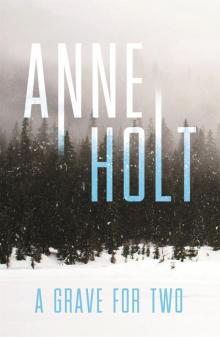 A Grave for Two
A Grave for Two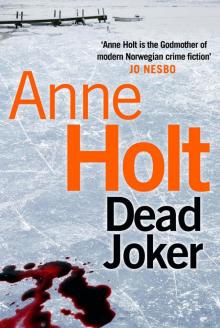 Dead Joker
Dead Joker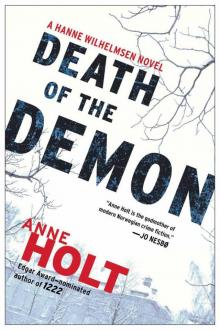 Death of the Demon: A Hanne Wilhelmsen Novel
Death of the Demon: A Hanne Wilhelmsen Novel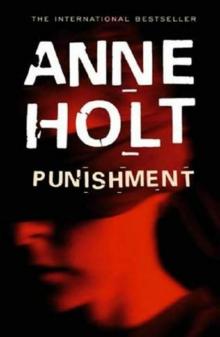 Punishment aka What Is Mine
Punishment aka What Is Mine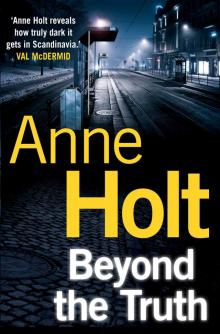 Beyond the Truth
Beyond the Truth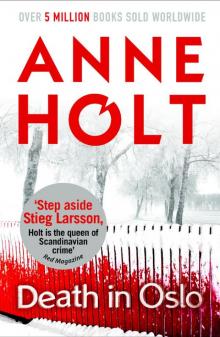 Death in Oslo
Death in Oslo The Blind Goddess
The Blind Goddess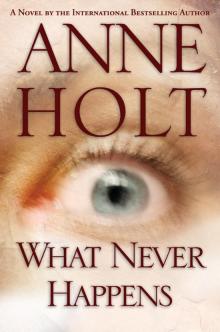 What Never Happens
What Never Happens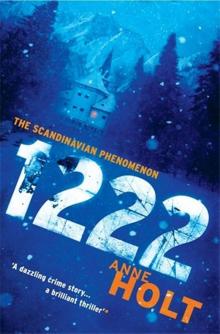 1222
1222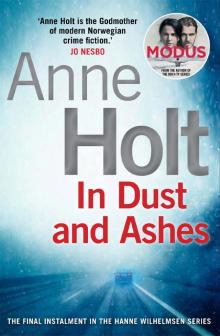 In Dust and Ashes
In Dust and Ashes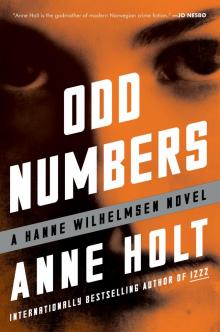 Odd Numbers
Odd Numbers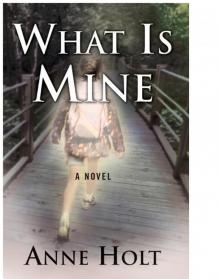 What is Mine
What is Mine What Dark Clouds Hide
What Dark Clouds Hide Blessed Are Those Who Thirst
Blessed Are Those Who Thirst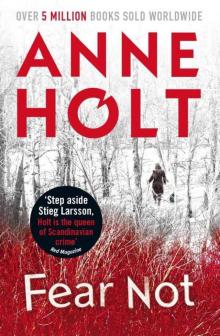 Fear Not
Fear Not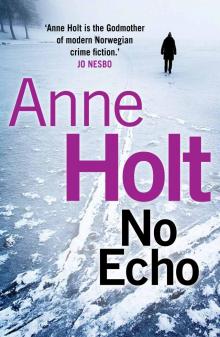 No Echo
No Echo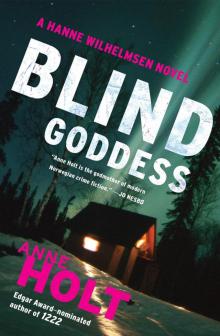 Hanne Wilhelmsen - 01 - The Blind Goddess
Hanne Wilhelmsen - 01 - The Blind Goddess